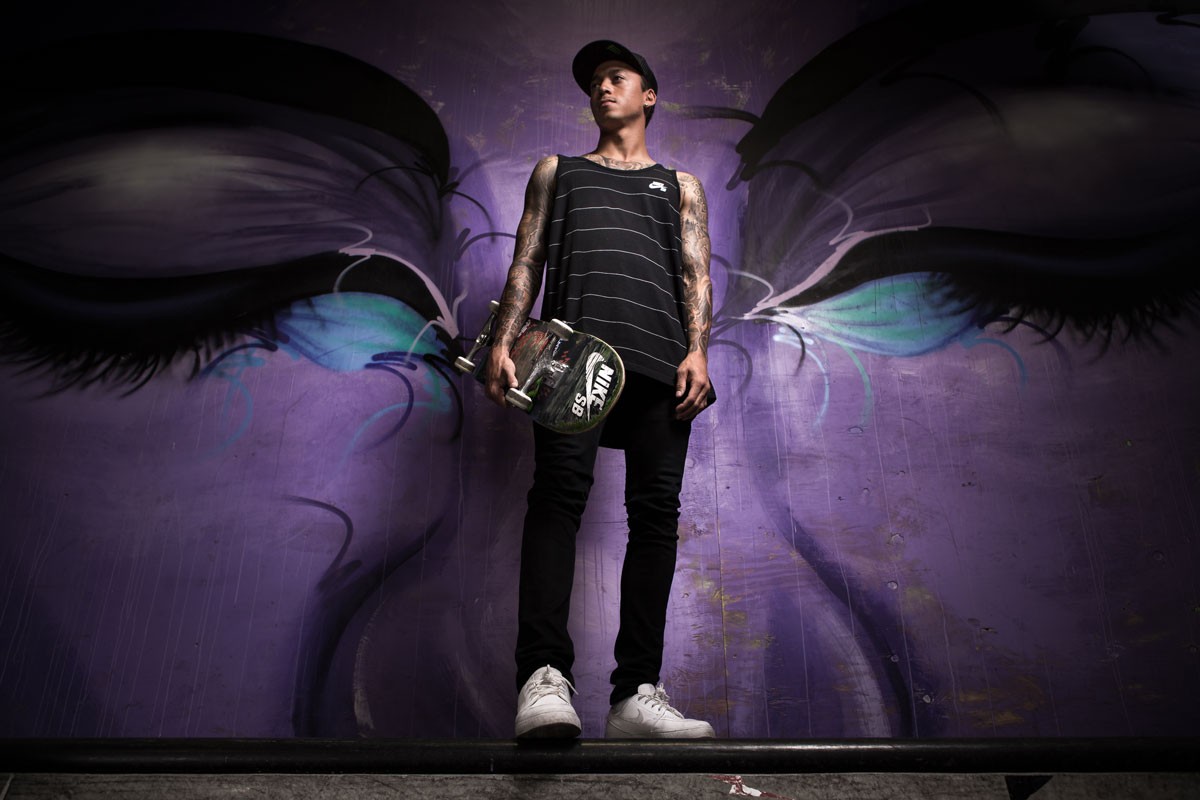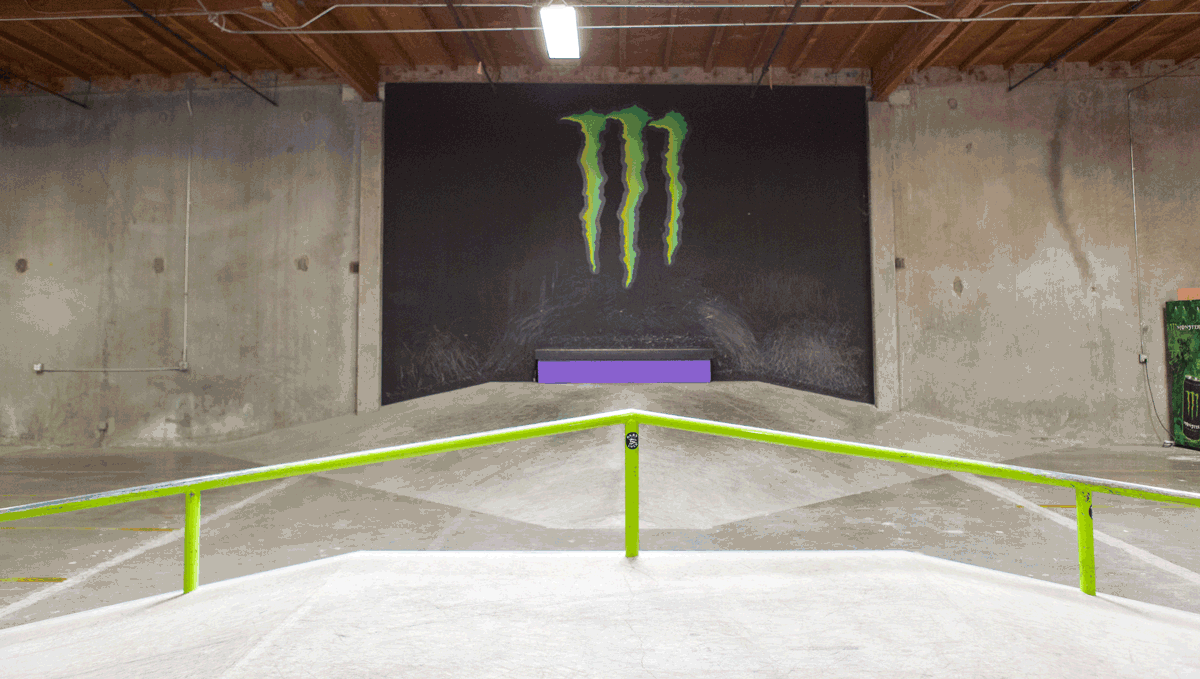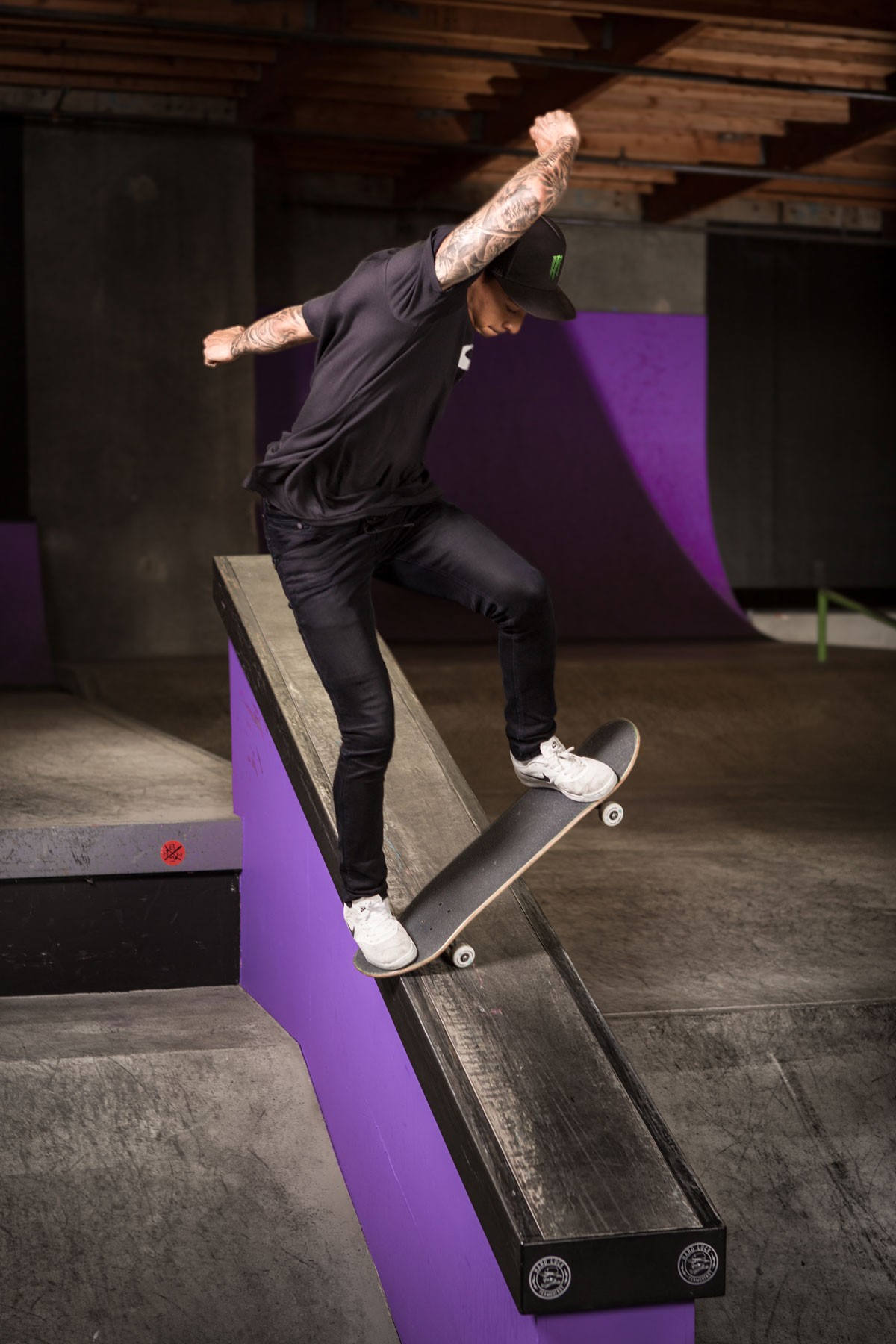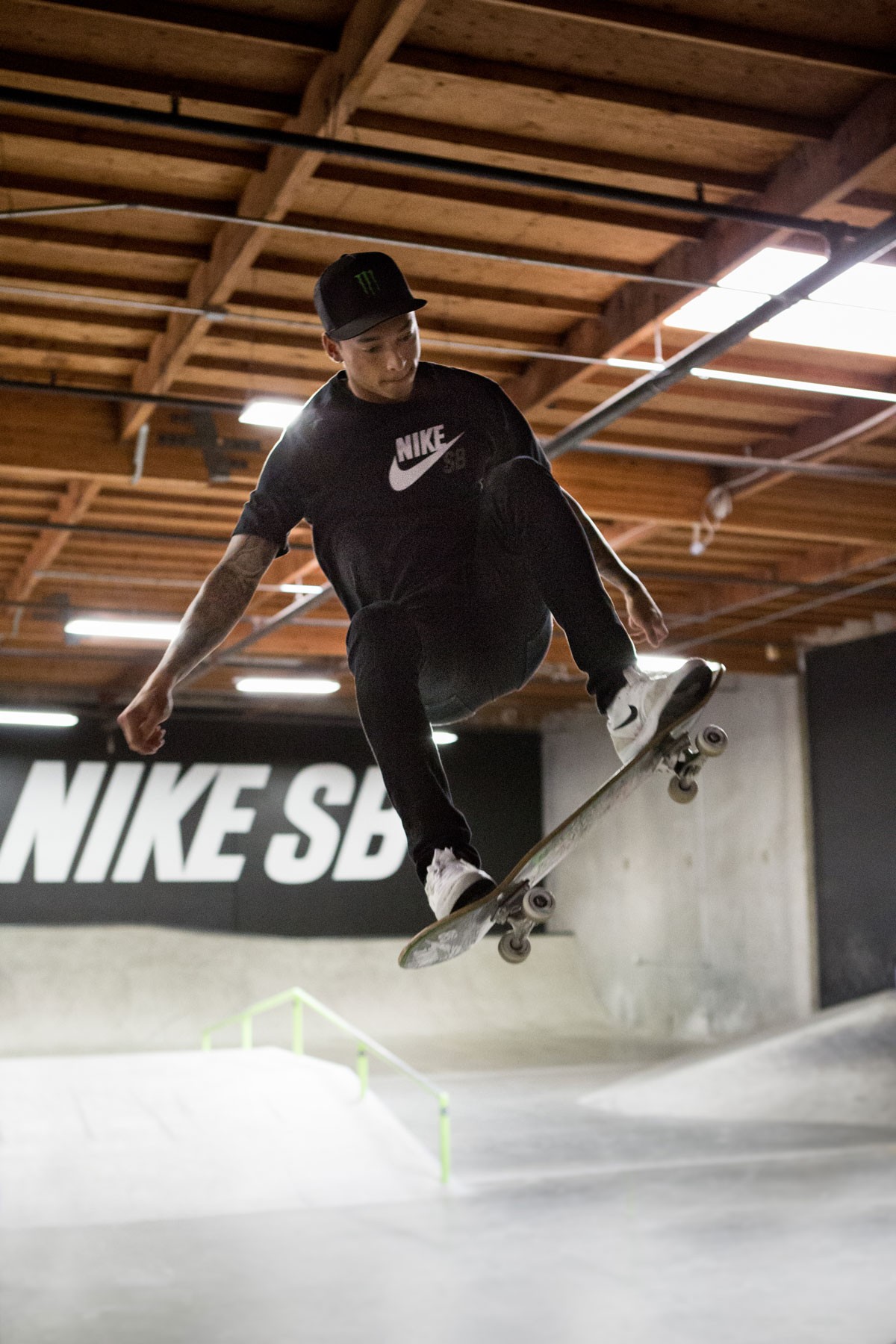
Nyjah Huston’s black Nike SB T-shirt hangs off his slender frame as he casually cruises around his private, indoor skate park in San Clemente. It’s the kind of setup every skater dreams of having—an entire warehouse full of ramps, rails, benches and stairs in all shapes and sizes. The neon-green rails and bright-purple women painted on the walls surrounding dark-stained concrete give the venue a bit of an electric eggplant vibe. With Future’s “March Madness” blaring from Huston’s iPhone through a pair of massive speakers, the only sign of the tranquil South County setting outside is the sunshine peeking through the open door of what would normally be the loading dock.
“I’ll be facing that way,” Huston says to a photographer, who’s trying to get the perfect shot of the young skater midtrick. “If you move the camera over there, you’ll get a better angle.”
There’s a reason Huston maintains such an elaborate park for only himself and his friends. It’s where he works and plays—often at the same time. Now 21, Huston has evolved into the face of skateboarding over the past decade. Since becoming the youngest competitor in X Games history in 2006, he’s won just about every street-skating competition there is to win. He has swept the X Games the past four years, dominated Rob Dyrdek’s Street League Skateboarding, and even took his talents to South Africa to win the Kimberley Diamond Cup—one of the biggest international contests—twice.
Huston’s mantel already holds major prizes including Thrasher Skater of the Year for 2013 and ESPY awards for Best Male Action Sports Athlete in both 2013 and 2014, while ESPN has also pegged him as the skateboarder responsible for the next several years of the sport. Aside from his incredible medal and trophy count, Huston has also earned more prize money over the course of his career than any skateboarder in history, an income he supplements with some of the sport’s biggest sponsorship deals from companies such as Nike SB and Monster Energy.
Asked whether Huston’s part in his famous 2013 video, Fade to Black, is too good and too insane that it makes the most ridiculous tricks seem mundane, Ian Graham of Jenkem magazine says, “I’m witnessing the literal progression of skateboarding. Nyjah is doing tricks that have never been done on spots that could easily kill you.”
For the next generation of skaters, watching Huston skate is akin to catching a glimpse of Steph Curry effortlessly shooting three-pointers. Whether in an international competition or alone in his practice space, he nails one 360-degree flip after another with more grace and ease than many land the most basic of kickflips. His crooked grinds last impossibly long amounts of time, whereas most skaters’ sputter out after a second or so. Huston’s techniques flow together as if painting strokes, while the precision and planning that goes into each run is chess-like.
With his short dark hair tucked under a black Monster baseball cap, Huston looks as if he could be any other kid at the skate park in his late-teens or early-20s. But his appearance belies his hardcore status. While most other young skaters are worried about their GPA or making rent on their first apartment, Huston just got back from earning a second-place finish at the Nike SB Pro Open in Barcelona. Although most of his peers aren’t in a position to buy a Ducati, an Audi R8 or a multimillion-dollar home like he has, Huston still cherishes the time he can spend as a normal 21-year-old. “I’m not the biggest fan of traveling, so when I have to go on a bunch of trips back to back to back, it gets hectic and sometimes feels like a job,” Huston says. “Most of the time, it’s all fun. I come and practice with my friends, and I have a bunch of free time to do other stuff and hang out with my friends. It’s awesome.”
* * * * *

Huston was born on Nov. 20, 1994 in Davis, the third of five children. He began skating when he was just 5 years old—alongside his older brothers and father, who purchased a private skate park in the city so the family could practice daily. When not working on his board control and fundamentals, Huston and his siblings followed a strict, home-schooled, Rastafarian upbringing. Raised with a vegan diet and dreadlocks spilling down his back, Huston acquired his first sponsor at 7, was being noticed all over the skating world by age 9, and won the Tampa Am—one of the world’s biggest amateur competitions—at 10, facing off against far-more-experienced teenagers and young adults.
[
Though seemingly born to skate, Huston put in more time and effort at a younger age than anyone else was willing to do. According to his mother, Huston’s dedication—combined with his quest for perfection—is what brought about his success. “He’s the same as a young adult as he was as a child,” Kelle Huston says. “His discipline was extraordinary. At 2 years old, he was picking out his outfits for the next day and hanging them on his door. He definitely had some major OCD. He always stacked his toys the same way, and he had a list of tricks that he would practice every day. He wouldn’t let himself move on until he’d landed every single trick in a row. So what happened over time is that he would do everything in the same order, and if he’d fall on one, he’d start over at the beginning. I think it was that repetition that made him so consistent.”
“Whenever kids ask how I got so good at skateboarding,” Nyjah Huston says, “my main answer is ‘Dude, any kid who loves skateboarding as much as I did when I was a kid and has a perfect place to skate all the time, they’re going to get good at skateboarding.’ I just wanted to skate every day, and I set my mind on learning a new trick every single day.”
It was that dedication that landed the 11-year-old Huston a spot in the top eight for his first professional competition, the Men’s Skateboard Street contest at the 2006 X Games. Huston wouldn’t win gold until 2011, but he’d proven that, as a child, he could hang with legends such as Chris Cole and Ryan Sheckler while they were in their prime. “It was definitely pretty intimidating, but it was awesome at the same time because I was kind of star-struck,” Huston says. “It definitely wasn’t easy starting to skate pro contests at such a young age, but it definitely helped me. It made me grow up fast.”
Just as Huston’s career began to build momentum and accolades for the young skater rolled in, his father—and manager, at the time—relocated the family to rural Puerto Rico without much warning or explanation. The rumor was that he didn’t want his children going to high school and embracing American culture, but what Huston’s father didn’t think about was the impact on the wunderkind’s profession. The move nearly ruined Huston’s career.
For a few years, the Hustons lived relatively simply on a farm with no running water in the mountains of the commonwealth. Just when he should’ve been coming into his own as a skater, Huston dropped off the map almost entirely, competing in only a handful of major contests between 2007 and 2009. Sponsors dropped him; his income plummeted. The family’s life began to splinter when his mother moved his siblings back to the States while Nyjah was away at a competition with his father.
Huston doesn’t entirely knock the experience. “Living out there helps me appreciate how easy life is here in California,” he says. “It teaches you to not complain about the little things like traffic. I got used to skating on rough ground, and everything was so much easier [back] here.”
In 2010, Kelle Huston won the legal battle to regain custody of Nyjah and moved with her children to Orange County so she wouldn’t have to leave the other four at home while bringing Nyjah to meetings and events all over the center of the skateboarding universe. The skateboarder was finally able to show the world just how much he’d grown—in size and talent.
That year, the then-16-year-old brought his family out of financial despair with three second-place finishes in major competitions—including the X Games—and a $150,000 win in the inaugural Street League Skateboarding competition. “I never doubted his talents,” Kelle says. “I knew he had all the skills to make it in this industry. When I got him back, there was so much drama that he said he was quitting skateboarding. The family drama was just too much for him. It was a big push to get him remotivated again, but once it clicked in him, he was pushing forward harder than ever.
“It was challenging on an industry level, too, because he had been semi-blackballed from the industry,” Kelle continues. “He couldn’t even get a free pair of shoes sent to him. He was actually going into the local skate shop to buy his own shoes, and people would notice that at competitions. His talent was so undeniable; it was just about getting him back on the map and getting him out there so other people could see it.”
[
As with Michael Jordan returning to the Chicago Bulls after an exile in minor-league baseball, Huston has dominated every competition he has entered since. Despite the years spent in Puerto Rico, Huston racked up more prize money than any skater in history by the time he turned 18. And he capped off 2015 by signing with Nike SB, trading in his deal with DC Shoes to skate for the biggest name in sports. The new sponsorship caused some minor outrage in the skating community, as many believed that Huston switching to Nike was the equivalent of their favorite band selling out or their hometown baseball player signing a massive contract that only the New York Yankees could offer. “Everybody has their own opinions, but who doesn’t want to ride for a company like Nike?” Huston asks. “They have the best product and the best team. No, I didn’t only do it for the money or whatever. I did it because it’s an awesome company, and it’s always been a dream of mine.”
Regardless of shoe deals and sponsorship contracts, any skater who has competed against Huston has to respect his talent. Kurtis Colamonico competed with the best of the best throughout the 2000s; he recalls going against Huston when he was barely a teenager and tying with the skater 10 years his junior on at least one occasion. “He’s been an amazing skateboarder since day one,” Colamonico says. “He gives it his best and never quits, which is exactly what a skateboarder needs to do to be where he’s at these days. I really want to see him keep it up.”
* * * * *

With 1.7 million Instagram followers, 2.2 million Facebook fans and hundreds of thousands of people on other social networking watching his every move, notifications light up Huston’s phone as though it were a slot machine. Within seconds of posting, his fans reply with dozens of heart and smiley emojis. There’s also a steady stream of people trying to reach Nyjah through his phone.
Perhaps it’s his sly smile or maybe it’s the flashy cars, but something about Huston draws more attention—on social media and otherwise—than any other professional skater who hasn’t had his own TV show. Keyboard warriors from all over the world seem to enjoy poking and prodding at the 21-year-old, but Huston’s used to it, handling it with a maturity that surprises many of his critics. “Obviously, there’s a ton of haters out there, but most of them just don’t make sense,” Huston says. “I’ll see kids who are like, ‘I met Nyjah one time, and he was a dick.’ I mean, maybe you caught me at the wrong time, when I was trying to practice at a contest or something, but I’m definitely not a dick to random kids. Other kids think I only skate contests for money, but obviously, that’s not how it is. There’s always going to be haters out there; I’m just out here skating and trying to have a good time.
“I’ll go through my Instagram comments all the time, and there are so many kids hating that it’s funny,” Huston continues. “To all those kids, spend your time doing something better. Go practice skating or do something productive. Don’t sit on Instagram and hate on random people’s photos.”
But online detractors are nice compared to his neighbors. After Huston purchased his home in late 2013, annoyed residents near his San Juan Capistrano mansion repeatedly called the cops to complain about the noise and crowds from the skateboarder’s late-night parties. The Orange County Register reported on the violations a few times and played up the raucous nature of Huston’s festivities, calling them “typical, privileged fun mixed with illegal drinking and beer bongs” and more. TMZ reported that Huston’s only punishment for the dozens of parties is a probationary agreement not to host anything at his home after 8 p.m. for a few years and a couple of hundred hours of community service. (Last December, Huston listed his estate for $3.48 million.)
When we asked whether Huston’s mixed ethnicity (reportedly Caucasian, African-American and Japanese) could have anything to do with the amount of scrutiny he’s placed under, the skateboarder’s publicist responded (via email), “I don’t think the race question is vital or relevant here. I think it starts to look like it’s about race when it’s not.”
While his “party boy” persona makes the news more, Huston’s latest passion is of a different sort. On Sunday, Huston will open his private facility to the public for the first time for the inaugural Flow Fest, a five-hour skating event put on by Huston’s charity, Let It Flow. For a $75 donation, up to 100 attendees get to spend the afternoon skating and hanging out with Huston, competing for skate gear; everyone there will get a free pair of Nike SB shoes.
[
“It’s going to be sick,” Huston says. “It’s really cool to be able to do events like that here and have kids come out who are so stoked to skate the park. It’s good times.”
The inspiration for Let It Flow came while living without clean running water in Puerto Rico. Huston decided that providing water to those without it was his ultimate purpose in life outside of skateboarding. “Back when I lived in Puerto Rico, my brothers and I would have to walk out to our little river and carry a bucket of water back to clean dishes or flush the toilet or whatever,” Huston says. “I think it was cool coming from that experience and realizing how tough it is to carry clean water and how heavy it is, and we were only doing it for a short distance.”
A handful of years later, Let It Flow has gone to the Philippines, Ethiopia, Haiti, Kenya, India and Chad to install wells and/or filtration systems; it also teaches villages how to repair and maintain the wells they already have in place. Huston has kept his charity work surprisingly low-key compared to his athletic exploits—and he likes it that way. “We’ve repaired about 50 wells that provide water for about 30,000 people,” Huston says. “Just that alone is an amazing feeling. We took a trip to Ethiopia, and just to see how stoked those kids were with the water pouring down, it was a really cool experience.”
* * * * *

Crouched over one of the biggest quarter pipes in his skate park, Huston looks slightly uncomfortable as the photographer asks him to hold his board at an awkward angle. He has been under bright lights and posing in different stances for a solid 10 minutes now. “I used to watch so many [professional skateboarding] videos when I was a kid; I definitely miss that part of it,” Huston says. “It’s cool that I can just throw a clip up [on Instagram] and so many kids see it, but I grew up with éS’s ‘Menikmati’ video with [Eric] Koston, [Bob] Burnquist, and all those guys. Or Transworld’s ‘In Bloom’? . . . I watched that video a bunch.”
As Huston thinks back to all the time he spent watching and studying the skate videos of those who came before him, he doesn’t seem concerned with the pressure put on him by the skateboarding world and various media outlets. Beyond the millions of dollars, dozens of trophies, and ludicrous amount of attention online and off, Huston’s a somewhat-quiet 21-year-old.
Despite the armada of cars and infamous parties, Huston doesn’t carry an air of arrogance or douchebaggery. As he looks down at his black jeans and white shoes, it’s clear that all of the fortune and fame is just white noise surrounding his true passion. “I just want to be able to skate as long as possible,” Huston says. “Skating is pretty rough on the body, and I’ve been jumping down big sets of stairs for over 10 years. I want to feel like I’m just starting, but I feel like I’ve been skating for so long. I want to keep my body healthy because I see guys like Chris Cole and P-Rod [Paul Rodriguez] who have been killing it forever. I want to be doing the same thing.”
Although the phenom doesn’t plan on giving up his board any time soon, Huston’s love of cars and adrenalin has given him one possible outlet for his post-skating career. “I would love to transfer over to some kind of rally car or something when I’m older,” Huston says. “I love cars, and I ride dirt bikes with my friends, but I think that would really be awesome.”
But that hobby will have to be put on hold for a while. Huston could still be skating professionally for another decade or two if he takes care of himself. As for everything else going on in his life, Huston does his best to block it all out as soon as he steps on his board. His private skate park serves as a spot to clear his mind as much as sharpen his skills, and the young skater plans on spending plenty more time in there. After all, the next 10 years of gold medals won’t win themselves.
“I’m a competitive person, but I don’t expect to win every competition,” Huston says. “If I win a couple each year, I’m cool with that because they’re never easy. I just want to keep getting better every day. That’s the thing about skateboarding: There’s always something I can learn.”
[Correction: We originally reported Huston won Thrasher ‘s Skater of the Year award in 2013. Huston was a finalist in the competition. The Weekly regrets this error.]

